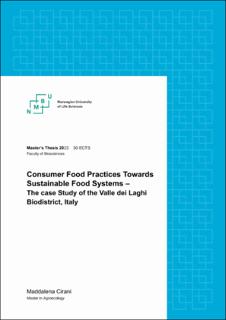| dc.description.abstract | The redesign of the global food system is urgent and biodistricts have the potential to lead the trajectory towards sustainable modes of production and consumption. Consumers are unanimously recognised a key role in achieving this goal, making the food practices of consumers in biodistricts particularly relevant. In this master’s thesis I investigate the Valle dei Laghi biodistrict in Trentino, Italy, through a case study. A constructivist approach and qualitative research methods underpin the research framework. During two months of fieldwork, I conducted thirty four semi-structured interviews with consumers and two interviews with producers. Direct observation served to triangulate the results. The findings complement the broadly discussed profiles of the passive consumer and the food citizen, with two additional new categories; the pragmatic consumer and the tradition-oriented consumer. The pragmatic consumer exhibits an understanding of food sustainability but acts opportunistically based on the context. The tradition-oriented consumer, although not driven by sustainability concerns, implements highly sustainable practices embedded in tradition and in the social and territorial fabric. Although time availability and affordability of organic food, along with access to land and exposure to marketing, impact on sustainable practices, individual worldviews appear crucial in shaping food choices and practices. Furthermore, different opinions emerge regarding organic and biodynamic agriculture and products. The sometimes inconsistency and ineffectiveness of food policy also surface from participants’ practices. The results provide insight into the local reality of a biodistrict and indicate how this could pave the pathway for sustainable food systems through new approaches to sustainability. | |
